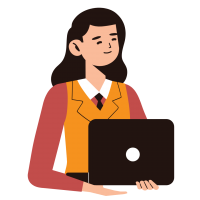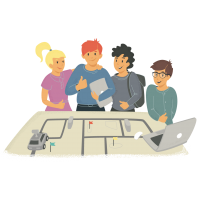Women in Tech Jobs, and Access to Computer Education
At Free Geek, we often talk about the work of Digital Inclusion. Inclusion as a deep focal point of our mission would be impossible without a complementary focus on sustainability, reuse, and ethical recycling. Today, we’d like to say that Free Geek’s reuse work wouldn’t be so successful without our Manager of Technology Refurbishment, Amber Schmidt, who works exhaustively to ensure there are enough devices to fulfill our program needs. Her work involves not just managing the growing team of refurbishment techs and the flow of computers they rebuild for the community, but involves refurbishing devices herself, facilitating shifts in process and tools, interfacing with tech giants, and acting as a key problem solver when folks run into weird issues with machines.
Meeting our community needs-- even amidst a pandemic and our resultant organizational changes, and a change in directorship-- shows that Amber is a cornerstone of our sustainability, always working in the big picture of why Free Geek’s work is important and why repair is so essential to it, and to everyone, in our digital world.
It’s important to say, too, that Amber doesn’t like to be tokenized. She’s a powerhouse-- but her identity as a woman is just her identity. She is so vital to us because of the quality of work that she cultivates, not because she’s a woman who strives to be “one of the guys”. She’s worked hard and has earned a lot of respect.
The truth is that more “girls”-- women-- and marginalized folks would be in tech jobs if they were more accessible. The facets of that accessibility are numerous; to graze the surface, if there were more intersectional policies, a deeper respect for the importance of DEI, and a steep departure from the “boys will be boys” attitude, as well as more learning on-ramps without barriers. Interest isn’t the issue. There will be more of us, both in the for-profit and non-profit sectors.
In Portland, we’re lucky to have a few large programs and organizations (like PDXWIT) that provide opportunities that get girls, women, and differently marginalized folks acquainted with the broad universe of “tech”-- via events, classes, networking opportunities, advocacy, and more. Unfortunately, much like how computer access isn’t universal, often unsubsidized and a constant struggle especially for ostracized communities-- these efforts don’t exist in most places.
Even classes in Computer Science and technology aren’t universally taught or offered in K-12 schooling. In Oregon, only 55% of suburban high schools teach CS at all-- and often, it’s an elective. It turns out that the issues of the “digital divide” are always bigger than we think. Access to information, stalwart representation, stigmas about how much more “difficult” the field is, as well as simple access to devices and internet, all play a role in the statistics. To boot, think about this-- over two thirds of all new jobs are computer technology related-- and we don’t even introduce a majority of K-12 kids to the basics.
Unsurprisingly, one study found that young women who try computer science via a fundamentals class in high school are up to 10 times more likely to major in it if they go to college. But, in Oregon, only 2 in 10 high school CS students are girls-- and in 2018, less than a thousand students (all demographics included) graduated with a bachelor’s degree in CS in Oregon-- only a tiny fraction of the number of students graduating with a B.S. in Oregon that year. Even in college recruitment fairs, women report being alienated before even getting a chance to apply for jobs or internships. Then again, evidence also points to a distinct “confidence gap” along binary gender lines in math and sciences starting in early grade school.
Contrary to the dominant belief and on the other hand of those statistics, though, a lot of folks without much exposure to tech jobs don’t know that a 4-year CS degree is only one of many avenues towards a computer technology career. Technology is one area of work, depending on the job, where your degree or lackthereof matters frequently less than your demonstrable, specific skills. Networking is everything.
Circling back to Amber, for example-- she had no idea she would “end up” working with computers. Interning at Free Geek 9 years ago in a totally different area put her at the fringes of a unique opportunity: She got curious, and despite the near-completely cis/straight/male centered tech culture in Portland, especially early on, she started to take advantage of the abundance of information around her. Classes at Free Geek led her to specialized volunteer shifts, then getting noticed for the quality and efficiency of her work; she had found a knack for refurbishing computers-- and the drive to grow those skills, even if she was wading into new territory. The especially communal ethos that was special to early Free Geek offered her a unique place to thrive, and underlined, too, how easily someone can be deterred from considering a career path when there’s little representation and lots of gatekeeping.
I worked my tail off to get where I am. I was surrounded by men who knew far more than I did about technology, but I leveraged that knowledge to learn and learn and learn. It was intimidating, and I thought about giving up and going back to retail many times. I knew I had to fight to be recognized as an expert in this field, especially with it already being so dominated by intelligent and highly skilled men; but no one was going to break that glass ceiling for me. - Amber Schmidt, Manager of Technology Refurbishment at Free Geek
Amber’s found passion for technology, her innate curiosity and tenacity, the quality of her work, and her belief in the heart of Free Geek-- and what it means to others-- are things that led her through a 9-year legacy of work with us so far, accumulating an impressive set of unique skills. Free Geek has changed and grown a lot in that time, and with it, the volume of different, passionate, cultivating people on our staff-- people that work hard to evolve a more whole and intersectional community of voices committed to inclusion, sustainability, access, and empowerment.
Free Geek works to provide and support technology education efforts, especially to marginalized, ostracized, and underprivileged people in our community and beyond-- we believe that technology is fundamental and a vital tool for equity everywhere, and everyone deserves safe opportunities to learn about it, use it, and work in it!

